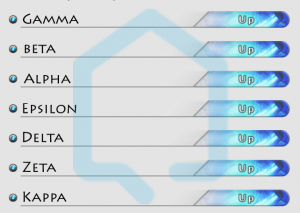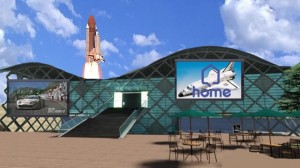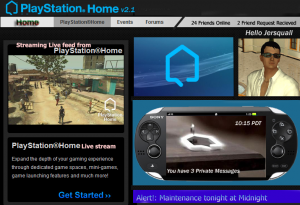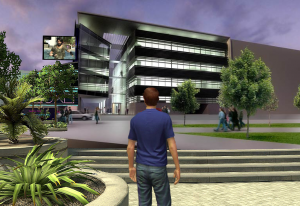A Salad Bowl, Not A Melting Pot
by Jersquall, HSM Podcast Editor
Technology can be a bit of a double-edged sword.
Moore’s Law more or less states that whatever you’ve got, right now, will be obsolete within a couple of years. Certainly, contrasting a video game from three decades ago versus one today would bear this out. For us, the consumer, it means that we can continue to look forward to games which are increasingly more complex, photorealistic and beyond.
On the flip side, however, software is limited by the constraints of the hardware. As has been discussed elsewhere in HomeStation Magazine and other sources, Home’s basic infrastructure has been around since at least 2007, if not longer.
In the world of electronic gaming, that’s an eternity.
Let’s also remember that Home is a heck of a lot more complicated than nearly any video game you can think of. Working within the limits of an infrastructure from four years ago can’t be an easy task; make any core client changes, and you have to rigorously test and make sure there are no unintended side-effects.
And yet such periodic changes and enhancements are necessary. Look at how Home has evolved, just since open beta first began. I don’t mean in terms of content – I mean in terms of infrastructure and interface. Home has evolved tremendously from the quaint, fledgling virtual reality it was less than three years ago.
Thus, I can’t help but wonder where it might go. And perhaps where I’d personally want it to go. Some things we had envisioned at the onset never came to be, and I often think about what Home might’ve looked like with those features implemented. Perhaps, one day, they might be.
Everyone has their own vision of what they would like to see. Most of us have no idea what the technological constraints are, but where there is sufficient application of money and imagination, little cannot remain unachieved. Consider this a personal daydream, then.
 Imagine Home with, say, twenty separate and dedicated servers, all named in Greek letters (alpha, beta, gamma, delta, epsilon, and so forth). A few would be test servers for Sony and not utilized by the public. The public servers would have different themes; they’d all have the same common spaces (Central Plaza/Home Square, Bowling, Mall, etc.) but would have different public spaces based on genre. Alpha server, for instance, could be the RPG server. Beta might be the FPS server. Gamma could be the racing server.
Imagine Home with, say, twenty separate and dedicated servers, all named in Greek letters (alpha, beta, gamma, delta, epsilon, and so forth). A few would be test servers for Sony and not utilized by the public. The public servers would have different themes; they’d all have the same common spaces (Central Plaza/Home Square, Bowling, Mall, etc.) but would have different public spaces based on genre. Alpha server, for instance, could be the RPG server. Beta might be the FPS server. Gamma could be the racing server.
In short, think of each server like a neighborhood in a city. Instead of a melting pot, Home would be more of a salad bowl; everything is in the same amount of space, but organized into separate elements.
A new Home user could choose which server to select as his personal “base” server. As a result, the Home population would segment itself based on gaming aesthetics, giving developers a clearer picture – based on population numbers – as to what percentages of Home’s population prefer which gaming genres. Home users could still freely navigate anywhere they wished, but they would be based out of the server — or neighborhood, if you will — that they prefer.
From a user retention standpoint, this segmentation of Home would play to one of humanity’s most basic traits: the desire to be communal. As Eric Hoffer points out, “When people are free to do as they please, they usually imitate each other.”
 Commonality is the driving force of most human interaction. We naturally gravitate to people who are like us and share our beliefs and interests. By creating neighborhoods within Home, you take this one-size-fits-all virtual reality and make it easier to facilitate social interaction. An RPG gamer, for instance, would probably have little to say to an FPS gamer; by creating an environment of like-minded individuals, the social interactivity increases. This would give people a strong motivation to come back and spend more time and money on the service.
Commonality is the driving force of most human interaction. We naturally gravitate to people who are like us and share our beliefs and interests. By creating neighborhoods within Home, you take this one-size-fits-all virtual reality and make it easier to facilitate social interaction. An RPG gamer, for instance, would probably have little to say to an FPS gamer; by creating an environment of like-minded individuals, the social interactivity increases. This would give people a strong motivation to come back and spend more time and money on the service.
Competition is another driving force of most human interaction. We compete for status, money, partners and beyond. And gamers are, by their very nature, competitive. By dividing Home into thematic neighborhoods, you can create server-versus-server gaming competitions. Imagine users battling to win the highest combined score in Sodium2 or Saucer Pop, for instance, in order to beat other servers and earn bragging rights and special prizes! THIS could be a very powerful way to harness social gaming in Home.
North America Home is often criticized for not holding enough community events. You can either try to get the community to work together (as Xi did), or you can pit the community against itself in friendly competition (as Sodium2 does, albeit on a smaller scale). Either way, it would give Home something it desperately needs in order to retain gamers: a purpose.
“There’s nothing to do in Home,” goes the familiar complaint. Ignore the fact that these people should be slapped; the reality is that Home is a virtual reality on a gaming console, and thus must make itself appealing to gamers. The easiest way to do this is by giving gamers the one thing that every game has: objectives.
How addictive would Home be to an FPS trophy hunter if he stumbled upon Home, found himself in Home’s FPS-themed server, and was approached by like-minded individuals all trying to enlist his help to beat the RPG server at Sodium2? You tell me that wouldn’t help with the user retention numbers.
 Let’s envision the interface for this revamped Home for a moment. As soon as you log into your specific server, We would have our own welcome page set up (perhaps similar to Google+ in its layout?). You could access everything at your Home page: check your private messages and statistics, see your rewards and downloads, et cetera. All of it would be safely tucked away on Sony’s server. You could purchase and download in-Home commodities and PSN wares from this page.
Let’s envision the interface for this revamped Home for a moment. As soon as you log into your specific server, We would have our own welcome page set up (perhaps similar to Google+ in its layout?). You could access everything at your Home page: check your private messages and statistics, see your rewards and downloads, et cetera. All of it would be safely tucked away on Sony’s server. You could purchase and download in-Home commodities and PSN wares from this page.
Heck, let’s take it one step further: you could see live streaming of Home to get a quick glimpse of what’s going on. You could also log in through your computer; imagine being on your laptop and logging into Home and the PSN!
There might be one additional benefit to this restructured Home: better behavioral controls. Imagine a repeat offender being banned from his base server, unable to ever return? This might add some social pressure to behave within the rules, as the risk of loss would be greater.
Before you wave your hands any further and tell me that none of this is possible: I’m sure most of this would never come to pass, even if it was technologically feasible. But perhaps some kernel of an idea in here is just the right inspiration for the right people to take Home in a wild new direction that would benefit us all. After all, the best business plans usually start with someone staring up into the sky and wondering, “What if…?”
Home is a social network for gamers. Home is also a gaming platform with virtual reality elements. Home is therapy, Home is a matchmaker, Home is respite, and Home is fun. Home is all of this, and more. And it is our voices that make Home such a special place. I, personally, like thinking about Home and its future.
My advice, in closing: spend less time caviling about what Home isn’t and try to enjoy what it is. Help shape what it will be. Get involved. You might as well, after all. Don’t fall into the trap of thinking your voice doesn’t matter; the last few core updates are proof that our feedback is taken into consideration.
So go big. Dream wild. From such ideas come inspiration. Where there isn’t the technology that moves mountains, there is the faith that moves them instead.



I have said it before… If your are looking a gift horse in the mouth, you standing in front of it so it can’t run…. get on and enjoy the ride. Counting teeth is much less enjoyable than seeing where the horse can take you. And who knows, along the way you may find something you have been looking for or better yet something u didn’t know you have been looking for. Besides… have you ever smelt horse’s breath? As a noob I just played my games. As I made friends Home became more important to me. As Home became more important I became more involved. The more involved I became the more I wanted to give back. The more I gave back, the better I feel. all that from just one gift horse. Well, I have said my peace, I’ll get off my high (gifted) horse. Great article as always Jers! Getty up!
Incredible new take on Home and its possibilities. I have only been here since December 2009, and I am already amazed at the changes and improvements that have been wrought in Home. Thinking about what the future of this place we all love is mind boggling, there are any number of directions that it can go and this article has shown that, and given a few wonderful ideas as well. Complaining gets you nowhere, solving does, and this is a great solution. Well written and thought out Jersquall!
Very interesting concept. I’ll think this over.
Very interest. A lot of great ideas here. I would like to see more community events here like they have in the Japan region. Very enjoyable read.